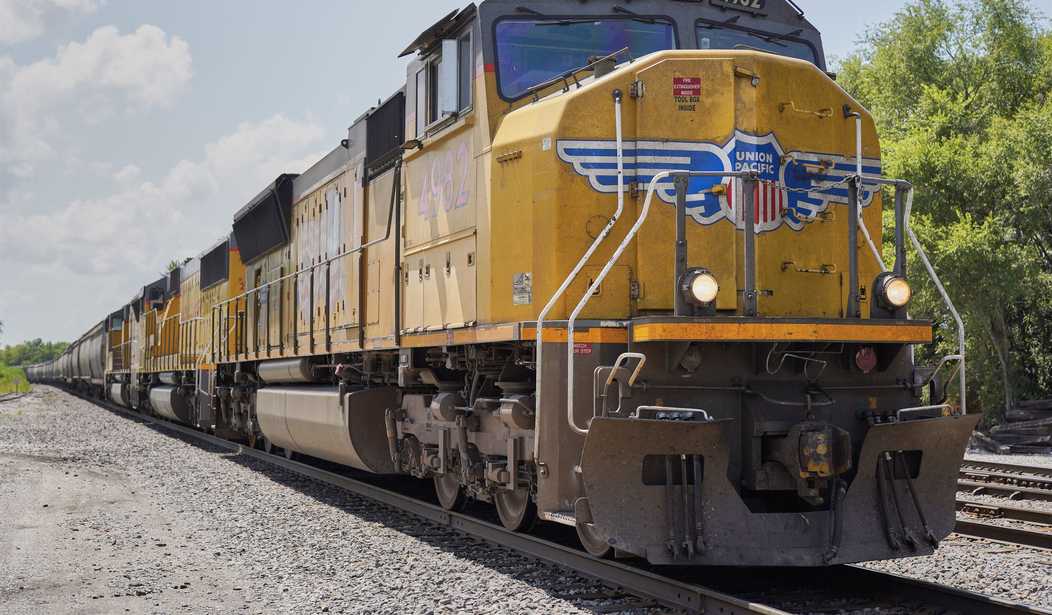For over two centuries, America’s railroads have been an engine for economic growth and commerce, moving grain from the heartland, granite from the New England states, cars from Detroit and energy from the oil fields and coal mines to every corner of the country. While the true backbone of our nation’s supply chains will always be the hardworking Americans who service these industries, competition has always been the catalyst that spurred unprecedented commerce. Multiple railroads, all supporting countless jobs and industries, kept each other honest, prices in check and service reliable — delivering unprecedented prosperity to every corner of the country.
Now, that balance could be under threat.
Union Pacific and Norfolk Southern, two of the nation’s largest freight railroads, recently announced a potential merger that would create the first coast-to-coast, transcontinental rail network in history, controlling roughly 40 percent of all U.S. freight rail. On paper, it sounds efficient, but it isn’t clear how this merger will meet the Surface Transportation Board’s (STB) requirement to “enhance competition.”What new rail-to-rail competition will be offered?
At Americans for Limited Government, we believe and know the free market is the best regulator. While free markets may not directly require the existence of competition, we know that free enterprise is best served by a framework that promotes competition. Thus, a single company with dominant control over key freight corridors isn’t disciplined by the market — it controls the market itself.
You don’t have to be an economist or a freight analyst to understand the risks posed by a merger of this magnitude. When one company calls all the shots, it’s everyday Americans who end up paying the price. The Union Pacific and Norfolk Southern merger could lead to higher transportation costs, poorer service and job losses. Those fears should cross party lines because they’re rooted in common sense and lessons learned from prior mergers.
The risks are clear, and America’s Heartland has the most to lose. Farmers already face unpredictable input costs and global market fluctuations; reduced rail competition would only make things worse. With fewer rail options competing for their business, shippers of grain, fertilizer and livestock feed could find themselves with little leverage and higher costs. In many rural areas, there’s no “second option” if service slips or rates spike.
Recommended
Energy producers would face the same squeeze. Whether it is oil from Texas, coal from the Western states or natural gas from Pennsylvania, competition in freight rail keeps costs in check and service accountable. If consolidation means one company can set the terms, there’s no guarantee those terms will work in favor of American producers or consumers.
America’s small businesses will also feel the squeeze. While not always the case, consolidation — particularly of this size — is often followed by higher consumer prices and less innovation, and the mom-and-pop stores will feel it the most.
But the damage wouldn’t just hit producers and consumers — America’s infrastructure may stand to suffer the most from a merger of this size. The pandemic taught America a painful lesson about supplychains. Over-reliance on a single supplier, factory or port creates a brittle system that can break down rapidly and trigger massive issues spanning numerous industries. Freight rail is no exception.
None of this is to say that mergers are inherently bad. Strategic partnerships can create efficiencies, improve service and strengthen our economy. But the standard that the STB must apply is clear: will the merger increase competition? When a merger threatens to create a dominant player in a critical industry, particularly one that moves the goods our economy depends on, policymakers, regulators and the public should demand clear evidence of substantial competitive benefits before signing off.
For America First conservatives, the questions are simple: Will this deal lower costs for American consumers by improving service for America’s producers and manufacturers? Will it strengthen supply chain resiliency? Will it meet its own stated goals in ways that actually increase competition?
If the answer to any of those is “no,” then conservatives should remember that our nation runs on competition, and it is time to speak up and ask your elected officials to consider the bigger picture on this merger — before the train leaves the station.
Robert Romano is the Executive Director at Americans for Limited Government.
Editor’s Note: Do you enjoy Townhall’s conservative reporting that takes on the radical left and woke media? Support our work so that we can continue to bring you the truth.
Join Townhall VIP and use the promo code FIGHT to get 60% off your VIP membership!

























Join the conversation as a VIP Member